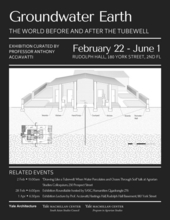Please join the South Asian Studies Council for a conversation between Anthony Acciavatti and Sunil Amrith focused on Professor Acciavatti’s newly debuted exhibition, “Groundwater Earth: The World Before and After the Tubewell.”
“Groundwater Earth” tells the hidden history of the largest distributed mass of freshwater on the planet. The fruits of groundwater are all around us: nearly half the global population drinks it and over half of all crops are irrigated with it. Groundwater extraction technologies are to agriculture and urban growth what the elevator was to the booming American metropolis of the early twentieth century. The exhibition traces for the first time the preposterous, practical, and perilous experiments with groundwater. It focuses on the Indo-Gangetic plains and Sonoran Desert—two major sites of experimentation with groundwater extraction since the nineteenth century. Combining over a decade of fieldwork in the Americas and Asia, with archival research undertaken in three continents and vast amounts of data collected using remote sensing satellites, Groundwater Earth examines the scales and slow-motion impacts of groundwater extraction on the tilt of the earth to the shape of cities and farms.
ANTHONY ACCIAVATTI
Anthony Acciavatti is the Diana Balmori Assistant Professor at the Yale School of Architecture. He works at the intersection of architecture, landscape, and the history of science and technology. His book, “Ganges Water Machine: Designing New India’s Ancient River” (awarded the 2016 John Brinckerhoff Jackson Book Prize), is a dynamic atlas of the Ganges River basin—the first such comprehensive atlas in half a century—based on a decade of fieldwork and archival research. His account of irrigation, geography, population, and climate is the basis of a traveling exhibition that has appeared at the Milan Triennial, biennials in Venice, Seoul, Rotterdam, Quito, as well as at the Nehru Science Museum, Rhode Island School of Design, Harvard University, and Columbia University.
Acciavatti is currently completing the manuscript of his next book, “Building A Republic of Villages,” which looks at the histories of science and environmental design in South Asia since the late-nineteenth century. He leads Ganges Lab at Collaborative Earth. Composed of a trans-disciplinary group of scientists, engineers, and designers, the lab is developing new forms of civic infrastructure that integrates the rhythms of the monsoons with urban growth and agricultural production. He is a principal of Somatic Collaborative in New York and a founding director of Manifest Institute, which publishes Manifest: A Journal of the Americas.
Acciavatti was trained in architecture at the Rhode Island School of Design and Harvard University, in the history of science at Princeton University, and a Fulbright Scholar in the department of geography and town and country planning at the University of Allahabad. Prior to his most recent appointment, he was the Daniel Rose (1951) Visiting Assistant Professor in Urban Studies (2019-2022) at Yale and taught at the Rhode Island School of Design, Columbia University, and Princeton University.
SUNIL AMRITH
Sunil Amrith is the Renu and Anand Dhawan Professor of History at Yale University, with a secondary appointment as Professor at the Yale School of the Environment. He is also the current Chair of the Council on South Asian Studies at the Whitney and Betty MacMillan Center for International and Area Studies.
Amrith’s research focuses on the movements of people and the ecological processes that have connected South and Southeast Asia, and has expanded to encompass global environmental history. He has published in the fields of environmental history, the history of migration, and the history of public health. Amrith is the recipient of the 2022 Dr. A.H. Heineken Prize for History, a 2017 MacArthur Fellowship, and the 2016 Infosys Prize in Humanities. His work on environmental justice received a “scientific breakthrough of the year” award from the Falling Walls Foundation in 2022.
Amrith’s new book, to appear in 2024, is “The Burning Earth,” an environmental history of the modern world that foregrounds the experiences of the Global South. His four previous books include “Unruly Waters”—shortlisted for the 2019 Cundill Prize—and “Crossing the Bay of Bengal: The Furies of Nature and the Fortunes of Migrants,” which was awarded the American Historical Association’s John F. Richards Prize in 2014.
Before coming to Yale, Amrith was the inaugural Mehra Family Professor of South Asian Studies at Harvard University from 2015-20, where he also served as co-director of the Joint Center for History and Economics, and Interim Director of the Mahindra Humanities Center (in 2019-20). From 2006-2015, he taught at Birkbeck College at the University of London. Sunil Amrith grew up in Singapore, and received his undergraduate and graduate degrees from the University of Cambridge.

